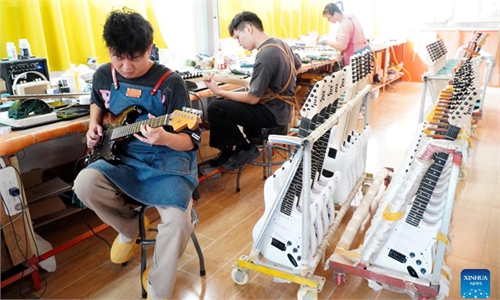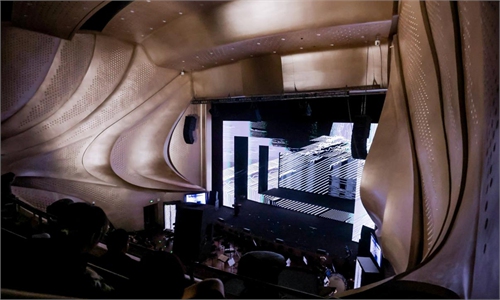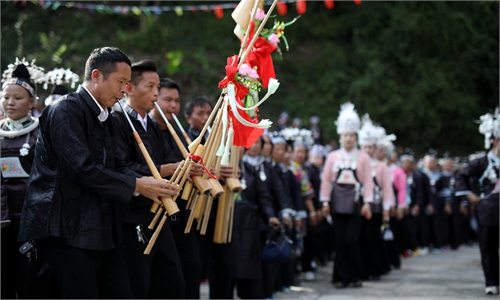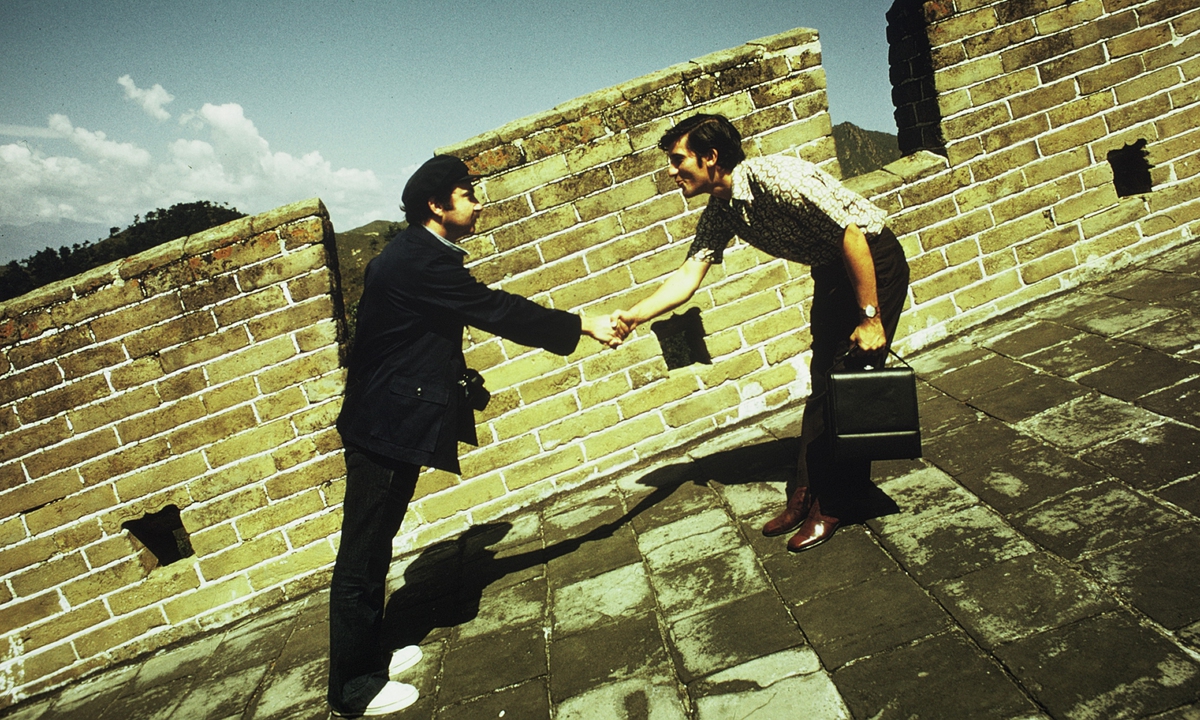
Members of the Philadelphia Orchestra receive a Chinese gong, a musical instrument known as luo in China, as a gift during their trip to China in 1973. Photo: Courtesy of China National Symphony Orchestra
Editor's Note:On Friday, the Philadelphia Orchestra will perform a 50th anniversary concert with the China National Symphony Orchestra at the National Centre for the Performing Arts in Beijing. They will also visit Shanghai and Suzhou.
The concert, hosted by China's Ministry of Culture and Tourism and organized by the China International Culture Group Corporation, will be jointly conducted by chief conductor of the China National Symphony Orchestra, Li Xincao, and assistant conductor of the Philadelphia Orchestra, Tristan Rais-Sherman.
There are plans to give master classes, host panel discussions, and hold a chamber music performance in Shanghai.
The orchestra is a vivid witness to the friendship between the two peoples of China and the US, and continues to carry on the legacy of people-to-people exchanges though music.
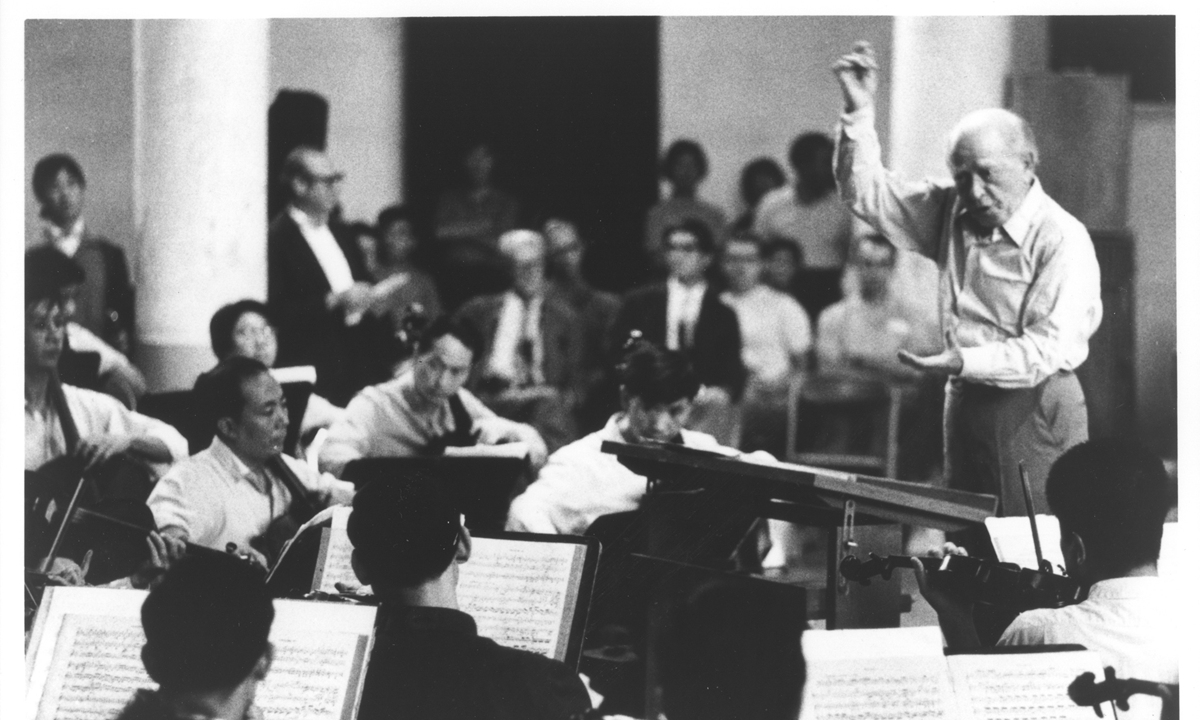
The Philadelphia Orchestra performs in Beijing in 1973. Photo: Courtesy of China National Symphony Orchestra
Exactly half a century after his first trip to China, 74-year-old American musician Davyd Booth still clearly remembers how he felt about the country at first glance, and is amazed at how dramatically the country has changed while the people remained hospitable and kind.This mid-November, the Philadelphia Orchestra will travel to China for a series of activities commemorating the 50th anniversary of the ensemble's historic 1973 tour of China, the first by a US orchestra.
As a member of the orchestra, violinist Davyd Booth participated in the 1973 tour, and this time he will return to China, yet again, and visit Beijing, Shanghai and Suzhou, to continue the friendship between the people of the two countries through music.
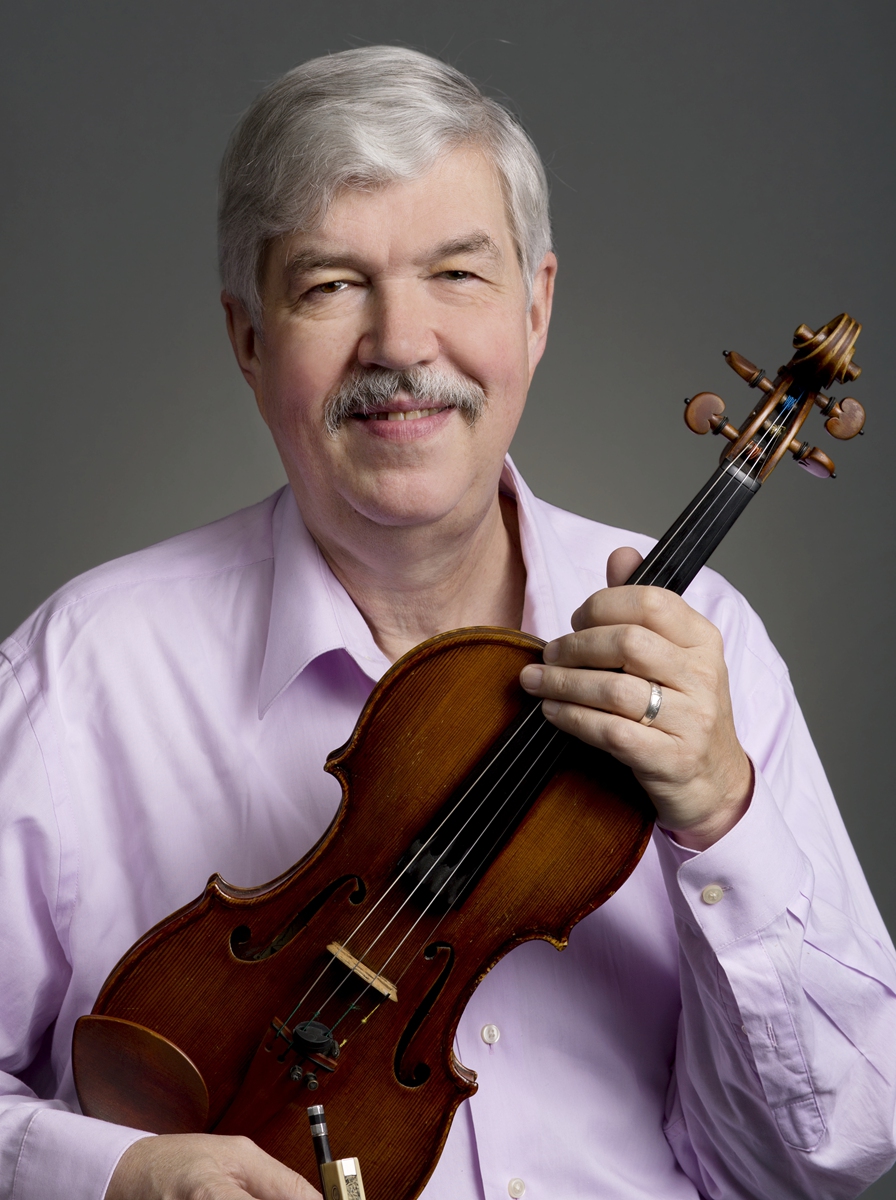
Davyd Booth Photo: Courtesy of Philadelphia Orchestra
In Beijing, master pieces including L'eloingement, Divertimento and Violoncello Concerto in B minor, Op. 104 are set to be performed during the concert."I would never forget my trip to China, which was a once-in-a-lifetime experience. I returned to China 20 years later, and found it completely changed," Booth recalled his experience with the Global Times.
Like most Americans, as a child, young Booth read about China in books and saw pictures of rice paddies, boats and great architecture. However, Booth didn't have the chance to visit China until he joined the Philadelphia Orchestra when he was 23.
When the orchestra made history that year by becoming the first US orchestra to perform in China, one of its members had a last-minute change of plans. The sudden illness of the violinist gave Booth the opportunity to replace him and witness a historic moment.
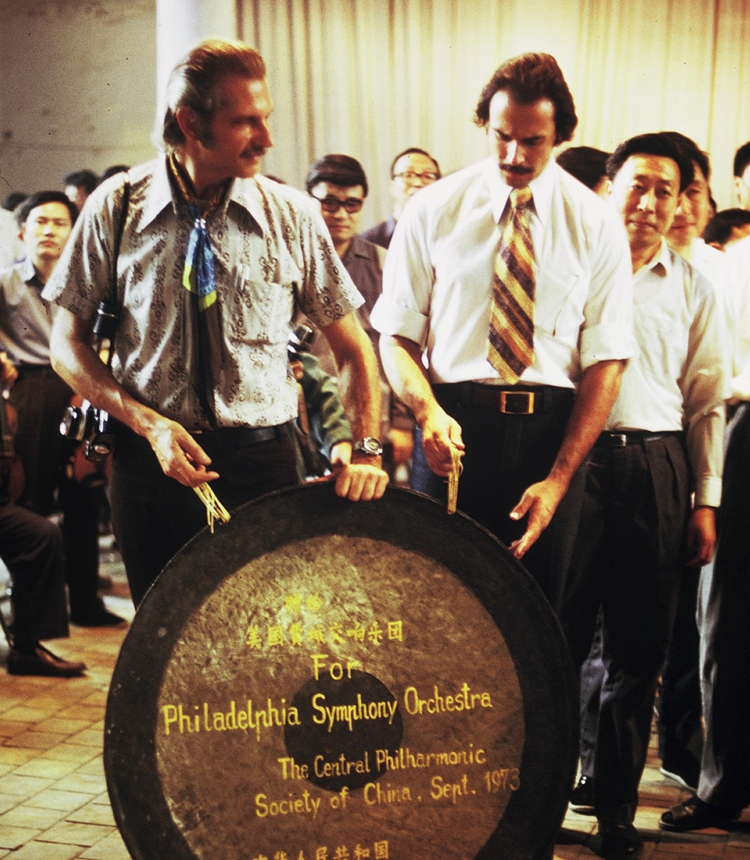
Members of the Philadelphia Orchestra receive a Chinese gong, a musical instrument known as luo in China, as a gift during their trip to China in 1973. Photo: Courtesy of China National Symphony Orchestra
Trip in 1973For two members of the then Central Philharmonic (now China National Symphony Orchestra), 90-year-old Zhu Xinren and 88-year-old Yang Shi, training and having exchanges with US musicians was an unforgettable experience.
Ormandy and other US musicians watched a performance by their Chinese counterparts on September 15, 1973. They showed great interest in string ensemble Two Springs Reflect the Moon, which had just been adapted by Wu Zuqiang, leader of the composition group of the Central Philharmonic. The Chinese charm of the melody immediately attracted them.
"They asked to get the score sheets in the hopes of performing it in the US. It was just finished a year before by Wu and the debut had made it possible for it to head to the US stage," violinist Zhu recalled.
Chinese conductor Li Delun led the Chinese orchestra in a performance of one movement from Beethoven's Fifth. Then he handed his baton to Ormandy and asked him to conduct the next movement. Ormandy led the orchestra, and everyone applauded.
"Music connects the world. He also praised us young performers for our strong receptivity. This can be said to have been a worldwide cooperation," said Zhu.
For Booth, the performance in 1973 was a success built on the foundation of the two orchestras' previous efforts.
"Music was a powerful tool for communication and connection, not only with other musicians, but also with the audiences," Booth told the Global Times.
"It was a great achievement. Both China and the US want to celebrate the 50th anniversary of the tour, which was a historic event. Music had a profound impact on people's lives, and the orchestras' performance in 1973 was a life-changing event for many people."
This tour will be the orchestra's 13th visit to China, and Booth has been in every trip. He is looking forward to not only the musical collaboration with Chinese orchestras, but also seeing the transformation and development of China.
"I've never seen a country change so dramatically and so quickly. I remembered there was one trip where we stayed in a hotel and watched a building being constructed at an astonishing speed. It was like something out of a movie."
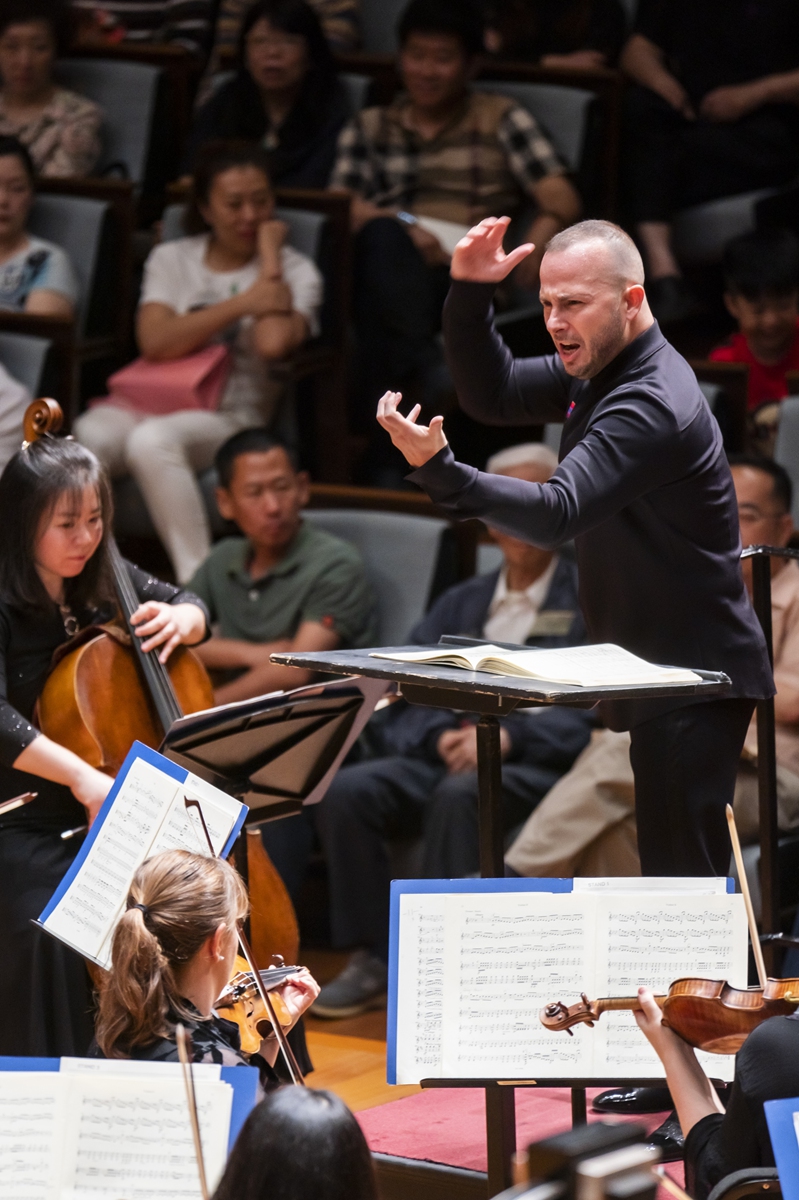
The Philadelphia Orchestra performs in China in 2019. Photo: Courtesy of China National Symphony Orchestra
Mutual respectBooth poured out his memories of his 1973 visit to China in a video conversation with the Global Times, in which he noted how amazed he was by the contrast of lifestyles in China and the US in the last century.
"At that time Beijing was a small city surrounded by fields, where farmers used wooden carts and water buffaloes. Everyone wore the same clothes, hats, and haircuts, making it hard to tell men and women apart. There were no tall buildings, few cars, and countless bicycles," recalled the musician.
He was impressed by the friendliness of the Chinese people, who were eager to interact with the US visitors.
"The orchestra was told not to talk to the Chinese people, and vice versa, but nobody followed that rule. We communicated through gestures and smiles, and felt mutual interest and respect. I was glad that I had the chance to see China in 1973, when it was still a mystery to most Americans."
Booth and the other musicians also never thought that the music played during their first Chinese trip would be heard not just by thousands of audiences in Beijing, but millions of people across the country through radio broadcasts on village loudspeakers.
Among them was a 16-year-old boy working in the rice fields in Central China's Hunan Province, Tan Dun, now known to the world for his Academy Award and Grammy Award winning music scores in Ang Lee's Crouching Tiger, Hidden Dragon.
One day in 1973, Tan heard beautiful but strange music filtering across the fields from a loudspeaker, a broadcast of the Philadelphia Orchestra playing in Beijing. The teenager paused in his work as they played Beethoven's Fifth.
"The symphony was like a silver light, emitting the sound of the future," recalled Tan, noting that it was the first time he had heard about a "symphony orchestra." Twenty years later, he received an invitation from the Philadelphia Orchestra.
Following in Tan's footsteps, a 10-year-old pianist named Lang Lang decided he would one day study in Philadelphia when he heard the orchestra perform in China in 1993 - the first time the orchestra had returned since the 1973 trip.
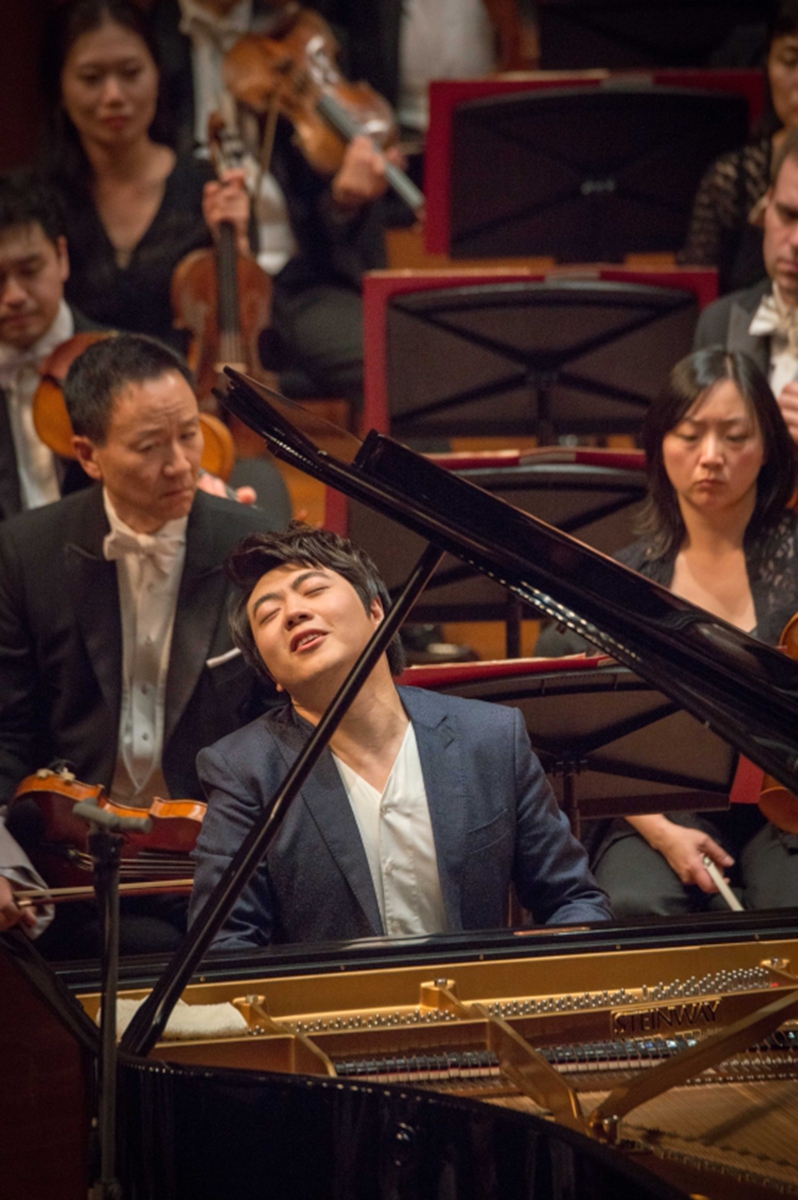
Chinese pianist Lang Lang performs with the Philadelphia Orchestra during a Beijing concert in 2016. Photo: Courtesy of China National Symphony Orchestra
Lasting friendshipFounded in 1900, the Philadelphia Orchestra has long had a close relationship with China. Dating back to the 1940s, the orchestra performed to raise money for China's Eighth Route Army led by the Communist Party of China during World War II to fight against Japanese invaders.
"Music has the power to connect and build bridges. We are delighted to commemorate the orchestra's historic 1973 tour and our 50-year relationship with the people of China during this residency," Matías Tarnopolsky, president and CEO of the Philadelphia Orchestra and Kimmel Center, Inc, told the Global Times.
"The 1973 tour is remembered to this day by many in China as a symbol of deep musical friendship, and we hope that our music-making will continue to build bridges between our peoples and cultures."
"The friendship between the two countries bridges all sorts of gaps as music brings everyone together. Now we have many Chinese members in the Philadelphia Orchestra. China is really a part of us," said Booth.

